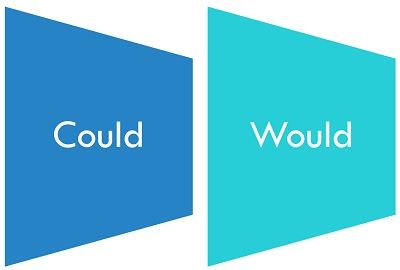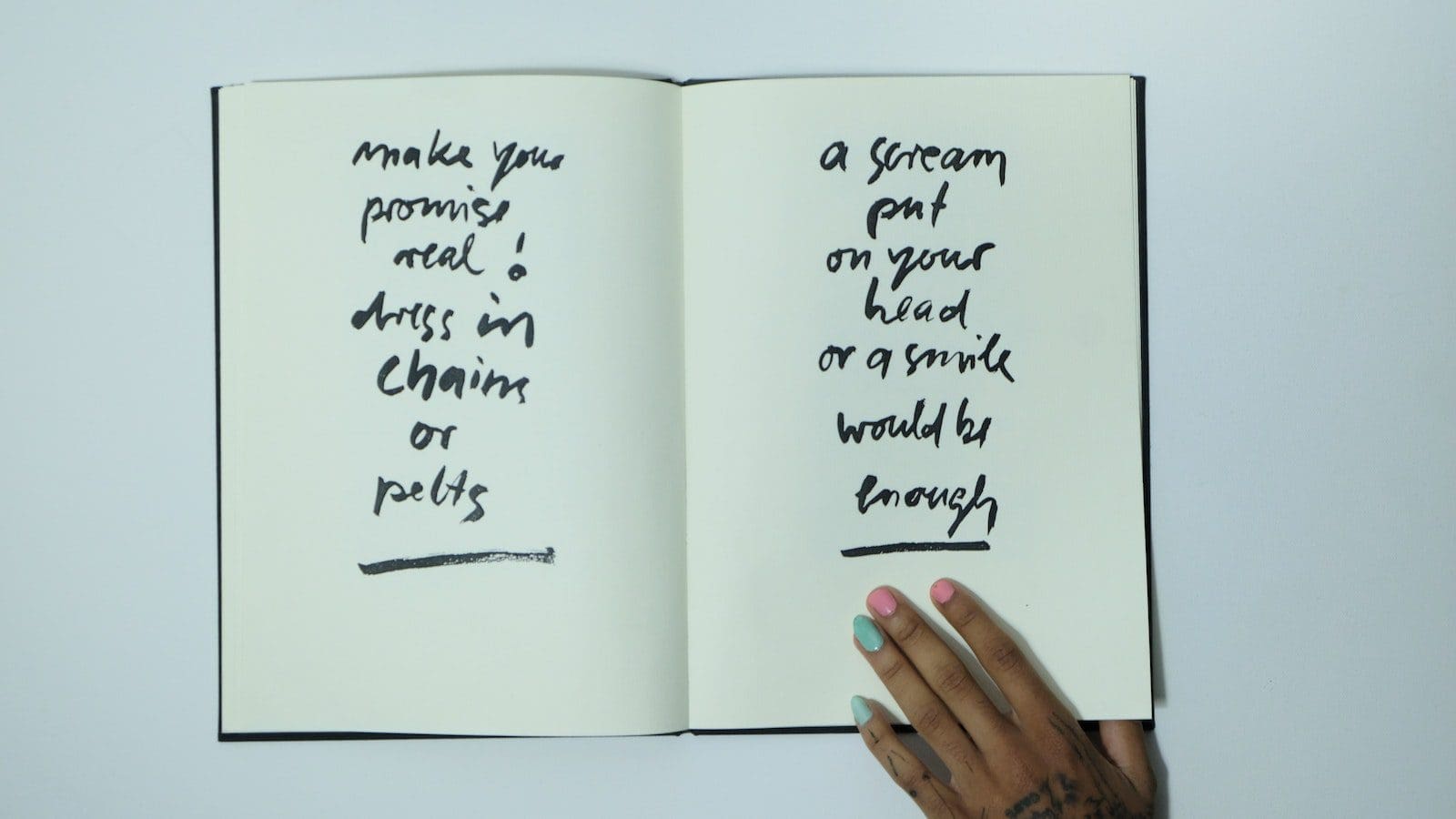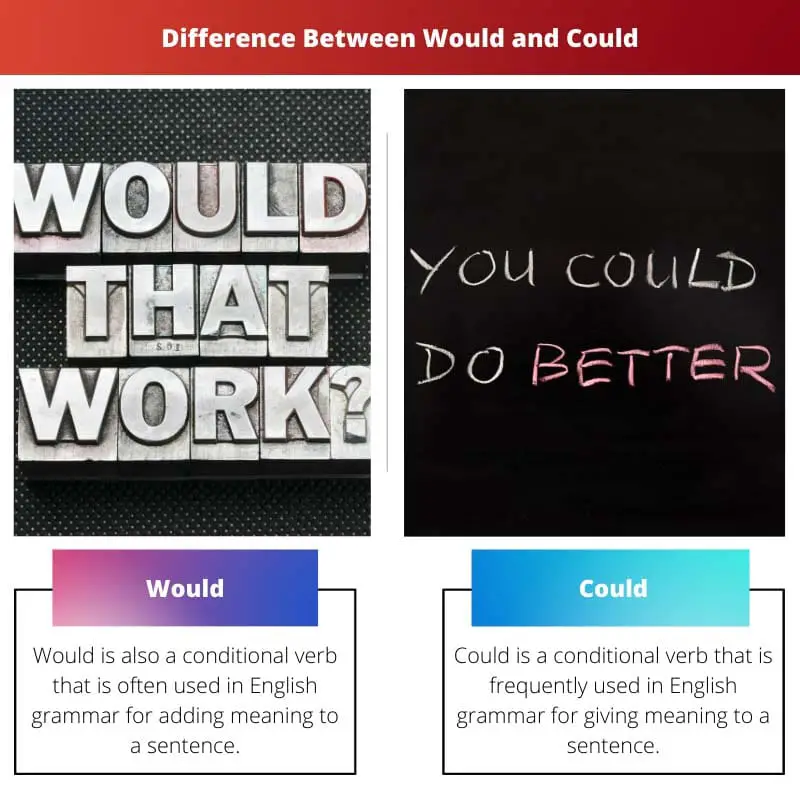
In the case of polite expressions, i.e. while making offers, requests, invitation, suggestion or permission, we often get confused, which one to use. So, let’s have a look at the examples given below to understand these two in detail:
- Rahul said ‘he could sing bhajans when he was a kid, but now he would play them on mobile.”
- Would you please be quiet so that I could sleep for an hour?
In the first sentence, could denotes ability, while in the second one it indicates the possibility. On the other hand, would talk about the future, but the outlook is past, in the first case. In the second situation, would is used to make a request.
Content: Could Vs Would
- Comparison Chart
- Definition
- Key Differences
- Examples
- How to remember the difference
Comparison Chart
| Basis for Comparison | Could | Would |
|---|---|---|
| Meaning | Could is mainly used to discuss possible actions or happenings, in the present or in future. | Would is used in sentences when we talk about situation which we only imagine or of things that happen frequently in the past. |
| Situation | Possible situation | Imaginary situation |
| Usage | It is used in making suggestion, request or seeking permission. | It is used in making request offer and seeking permission. |
| Examples | I could have gone to the parlour. | I would like to go America. |
| She could walk 50 miles in a day, when she was young. | Would you mind if I take your novel? | |
| Maybe she could meet Piya when she go to Amsterdam. | I would meet you, but I was little busy. |
Definition of Could
‘Could’ is used to express past possibility, i.e. something that is possible in the past situation. It can also be used in giving suggestions to someone or making polite requests. Now let’s take a look at its usage:
- To indicate something which you are able or permitted to do:
- In my childhood, I could play basketball.
- You said we could go for lunch when I complete the assignment.
- To make requests, i.e. asking someone to do something:
- Could you stay there for an hour, I am just on the way?
- Could you tell me the exact address, please?
- Could you please close the door?
- To ask for permission:
- Could I have the bowl, please?
- Could I take your notebook?
- To show the possibility:
- You could have joined us.
- To give a suggestion:
- We could go by train instead of the bus.
Definition of Would
The word ‘would’ is used to talk about a future time, from the past viewpoint. It refers to something, which is just an imagination, i.e. a situation which is not real or unlikely to happen. It also indicates the willingness or inclination towards something. Let us now discuss its usage:
- To state things that may happen in future, from the past standpoint:
- Prateeksha said she would go for a meeting on Monday.
- I was a bit excited to know what would be the result of the game show.
- For making requests, i.e. asking someone to do something:
- Would you please give me some time to think over it?
- To express intention, from the past standpoint:
- You said you would always help me.
- She promised, she would not let me go.
- To ask for permission:
- Would you mind if I go and meet my friends tonight?
- Would it be Okay, if I am out of town for three days?
- To make an offer or invitation:
- Would you like to come over our place tonight?
- I would like to have oranges.
- To represent the possibility:
- She would not like to go to the party.
- I think Raman would come this week.
- In conditional sentences:
- What would you do if you became a celebrity overnight?
The difference between could and would are presented in the points given below:
- Could is the past tense form of the verb ‘can’ which indicates a past ability of someone or possibility of an action or happening. On the other hand, would is the past of ‘will’ which indicates the intent or willingness of a person, in future, but from the past situation. It is also used when we are talking about an imaginary situation.
- Could is used when the situation is possible in the past. On the other hand, would is used when the situation is unreal or unlikely to happen.
- When it comes to polite expressions like requests, permission, we can use both could and would. However, when we are making a suggestion, we explicitly make use of the word could, and if we are making an offer or invitation we use would.
Examples
Could
- I could go to the party.
- She is so upset that she could travel for a week.
- Right now the circumstances are favourable, but it could be out of our control.
Would
- It would be great to travel the world, but I have no money.
- I would call the Police if I had my cell phone.
- When she was not in a mood to talk, she would go to the lake, to be alone.
How to remember the difference
When it comes to requests, we can use both could and would, but could is more formal and polite than would. While making polite requests, could is used with suggestions, as it indicates a possibility. On the contrary, would is used with offers or invites, because it is more usual.
English is full of verbs that seem interchangeable or at least only trivially different, but skilled writers know when and how to use them for maximum clarity.
Could and would are two such verbs. They both have many uses, which makes them confusing for many beginning writers and English language learners.
Although they seem similar, there are definite situations when one word is more appropriate than the other. Verb choice is a crucial part of careful writing, so read on to find out the differences between these two confusing verbs.
What is the Difference Between Could and Would?
In this article, I will compare could vs. would, and I will use both words in several example sentences. This way, you will be able to see them in their proper context.
Additionally, I will show you a memory tool that can help you choose would or could correctly every time.
When to Use Could

Could is the past tense of can, a verb used to denote ability. In this sense, could refers to some ability that someone had in the past.
For example,
- In high school, I could dunk a basketball.
- In my prime, I could bench press 250 pounds.
In both of these examples, could is being used to express an ability that the speaker had in the past.
In other instances, could is a modal verb used to denote possibility. It is also used for some conditional present and future tenses of can.
For example,
- You could have gone to the park with your friends if you had finished your homework on time.
- Over the next three days, temperatures could reach the low 20s in Washington, posing one last crucial test for the buds. –The Washington Post
In both of these examples, could is expressing possibility: things that could have been true or things that could yet come true.
For more on condition sentences, see here.
When to Use Would

Would is the past tense of will, which denotes both ability and certainty.
- In high school, I would do my homework on the bus.
- While I was working, I would go out to eat more frequently.
In these examples, the speaker is using would to express a past action, which is helpful when comparing would vs. could.
Let’s take the first of these two examples,
- In high school, I could do my homework on the bus.
- In high school, I would do my homework on the bus.
As you can see, could is simply making a statement of ability. When I was in high school, I could do my homework on the bus. I had the ability to do my homework on the bus, but this doesn’t mean that I did. I simply had the ability to do so.
Conversely, would is making a definite claim. Doing my homework on the bus was something that I did do, not just something that I had the ability to do.
Would is also a modal verb used to denote possibility, and it often refers to something that is conditional but definite within those conditions.
Here are some examples,
- If I were to take a vacation, it would be somewhere warm and tropical.
- I would buy a big house if I had a million dollars.
- A mega-luxury deal that would merge Neiman Marcus with the company that owns Saks Fifth Avenue is in the works, sources told The Post. –New York Post
Again, these examples make definite claims. Let’s again look at the first example,
- If I were to take a vacation, it could be somewhere warm and tropical.
- If I were to take a vacation, it would be somewhere warm and tropical.
As you can see, could is making a simple claim of ability. If I were to take a vacation, it could be somewhere tropical, but it also could be somewhere cold—perhaps Colorado to go skiing.
But, when we use would, there is no question where the vacation will be. It will be somewhere tropical.
Trick to Remember the Difference

A good way to remember the differences between these two words is simply to bring each word back to its root verb.
- Could is the past tense of can.
- Would is the past tense of will.
If you are looking to make a statement of ability, think to yourself, “I can do that.”
If you are looking to make a statement of certainty or intent, think to yourself, “I will do that.”
This won’t always get you to the right answer, but it should work most of the time.
Summary
Is it could or would? Both could and would are verbs that have many senses.
- Could is a conditional verb that expresses possibility.
- Would is a conditional verb that expresses certainty, intent, or both.
Could is also the past tense of can. Would is the past tense of will. Both of these words start with the same letter as their root verb, which makes them easy to remember.
Contents
- 1 What is the Difference Between Could and Would?
- 2 When to Use Could
- 3 When to Use Would
- 4 Trick to Remember the Difference
- 5 Summary
• Categorized under Grammar | Difference Between Would and Could
Would vs Could
“Would” and “could” are two English language words which are the past tense of the words “will” and “can.” “Would” and “could” are used for representing the past tense as well as in the present tense to express a request. They are used for other expressions also which will be discussed here.
Usage in the past tense
The past tense of the word “will” is “would.” “Will” by itself is used for the future tense; it denotes the future possibility of somebody doing something or some event happening in the future. For instance,
“I will go to the market in the evening today.”
When we refer to a past incident, we use “would” in place of “will,” as in;
“I remember my mother would take me to the market everyday when I was little.”
The past tense of the word “can” is “could.” “Can” is used in the present tense and expresses the capacity to do something or the capability of someone to be able to do something. For example,
“The parents and teachers of the girl know that she can excel in her class and can get admission to the best colleges.”
When referring to the past tense, the same can be written as;
“The parents and teachers of the girl knew that she could excel in her class and could get admission to the best colleges.”
Usage in interrogative sentences
“Will” and “would” are used in interrogative sentences. Sometimes, to be extra polite, “would” is used in place of “will” to ask a question. For example,
“Will you go out for coffee with me?”
To make it extra polite, the same thing can be asked as;
“Would you like to go out for coffee with me?”
“Can” and “could” are also used for interrogation, but we know “can” is used to express someone’s ability to do something. It is an auxiliary verb which expresses a polite request, possibility, or seeks permission. The context where it is used is different. For example,
“Can you look after my children for one hour?”
For being extra polite the same can be written as;
“Could you please look after my children for one hour?”
“Could” is also used to seek permission, for example,
“Could I leave the office one hour early today?”
“Could I take one month’s leave?”
Other usages
“Would” is used to express a habitual act or repeated act in the past. When somebody does something out of habit, it is denoted by “would” like;
“He would go for a morning walk every day at 5:00 a.m. sharp.”
“She would bake cookies for her grandchildren every Sunday.”
Summary:
- “Would” is the past tense form of the word “will” while “could” is the past tense form of the word “can.”
- “Would” is used to express an habitual act or repeated act in the past, seek permission, or for being polite while “could” is an auxiliary verb which expresses a polite request, possibility, or used for seeking permission.
- Author
- Recent Posts
Read More ESL Articles
Search DifferenceBetween.net :
Loading…
Email This Post
: If you like this article or our site. Please spread the word. Share it with your friends/family.
Cite
APA 7
Kaushik, N. (2016, June 8). Difference Between Would and Could. Difference Between Similar Terms and Objects. http://www.differencebetween.net/language/grammar-language/difference-between-would-and-could-2/.
MLA 8
Kaushik, Nimisha. «Difference Between Would and Could.» Difference Between Similar Terms and Objects, 8 June, 2016, http://www.differencebetween.net/language/grammar-language/difference-between-would-and-could-2/.
Written by : Nimisha Kaushik.
and updated on 2016, June 8
Articles on DifferenceBetween.net are general information, and are not intended to substitute for professional advice. The information is «AS IS», «WITH ALL FAULTS». User assumes all risk of use, damage, or injury. You agree that we have no liability for any damages.
Grammar can be quite a challenge to learn and adapt to while learning a new language.
When it comes to English grammar, the job just tends to become a little harder since it is one of the languages with many rules and possibilities of a wrong rule being applied to change the meaning of the sentence.
Could and would are two such words whose differentiation is not well known. The common usage for both are portraying requests but apart from these, they are not to be used in the same sentence in place of the other. But how do we identify which one to use where?
Key Takeaways
- Would and could are modal verbs used to indicate possibility or willingness.
- Would is used to express a hypothetical situation or a future intention.
- Could is used to express ability or possibility in the present or future.
The difference between Could and Would is that could is used to portray requests or for asking permissions whereas would is used for describing a probability or a possibility. They can also be used for portraying preferences.
Want to save this article for later? Click the heart in the bottom right corner to save to your own articles box!
Could is the past principle of ‘can’. It is usually used for seeking permission and is applied only for possible situations. This means the situation is not created but it is your presence in the situation that is being questioned. For example: Could I go to the party this weekend?
Would is the past principle of ‘will’. Though they are also used for making requests, their main usage is for portraying probability or preference in a given situation. They are mostly applied to imaginary situations. For example: Would I be able to visit Mars someday?
Comparison Table
| Parameters of Comparison | Could | Would |
|---|---|---|
| Meaning | The past tense of can | It is the past tense of will |
| Implication | Implies seeking permission or ability of an individual | Implies probability, preference, etc. |
| Main Usage | It is mainly used to portray requests | Used in reported speech, or to express habitual actions |
| Secondary usage | For expressing ability | For expressing probability or possibility |
| Situation | Used in possible situations | Used in imaginary situations |
What is Could?
Could is a conditional verb that is frequently used in English grammar for giving meaning to a sentence. On changing the context of the word ‘could’, the meaning of the sentence may also change.
It is mainly represented as the past tense of the word ‘can’ and is often seen to be used in sentences where there is a request being made or there is a requirement to seek for permission.
For example:
- “Could I go outside today?” – In this sentence, ‘could’ is used for seeking permission
- “Could you come with me?”- In this sentence, ‘could’ is used for making a request.
The other application of the word is for showing annoyance or for showing strong denial. For example:
- “Could you please go away now?” – ‘could’ in this sentence is used for showing annoyance.
- “He talks so much that I could run away from here.” – ‘could’ in this sentence is used to show a strong denial of wanting to continue being in the given situation and the need to get away from it.
What is Would?
Would is also a conditional verb that is often used in English grammar for adding meaning to a sentence. This conditional verb also has many applications and are mostly seen to be used in reports.
They are the past principle of ‘will’ and are often seen to be used to express habitual actions of an individual. For example: “She would do that.” Or “It is something she would do.” They are typically also used for showing possibility or asking and expressing preferences.
For example:
- “Would it rain today?”- here, ‘would’ is used to show possibility.
- “I would prefer tea over coffee.”- here ‘would’ is used to express a preference.
Main Differences Between Could and Would
- Could is a conditional verb that is defined as the past principle of ‘can’ whereas would is the conditional verb that is used as the past principle of ‘will.’
- The two words imply different meanings and this is what differentiates them. The word ‘could’ implies seeking permission or making a request. On the other hand, the word ‘would’ implies preferences and probabilities during a situation.
- Since the implications are different, their primary applications are also different. Would is used in reported speech and for showing habitual actions whereas could is used for making requests.
- The secondary application of the word ‘would’ is for expressing probability and preference. The secondary application of the word ‘could’ is for expressing one’s ability.
- The situations the two words are used can also be sued for clearing their separate usage. Could is used in possible situations as it would be indicating the possible presence of something during an actual situation. In the case of would, it is used in imaginary situations as the scene or the necessary situation is not happening yet.
References
- Oxford Modern English Grammar – Bas Aarts – Google Books
- Modal expressions in English (semanticscholar.org)
Emma Smith holds an MA degree in English from Irvine Valley College. She has been a Journalist since 2002, writing articles on the English language, Sports, and Law. Read more about me on her bio page.
By: | Updated: Jul-19, 2021
The contents of the Difference.guru website, such as text, graphics, images, and other material contained on this site (“Content”) are for informational purposes only. The Content is not intended to be a substitute for professional medical or legal advice. Always seek the advice of your doctor with any questions you may have regarding your medical condition. Never disregard professional advice or delay in seeking it because of something you have read on this website!
You will often hear people saying that they could have done something. They could have done it, but they didn’t do it. Another expression that is used frequently is: “I would love to do that, but I can’t”.
The difference between these two phrases is actually not very obvious and many people make a mistake by using them interchangeably. The difference between the two phrases could be derived from the meanings of these words in their respective contexts. We will discuss the differences between Could and Would in this article.
Contents
- 1 Summary Table
- 2 Definitions:
- 3 What is Could?
- 4 What is Would?
- 5 Uses of Could
- 6 Uses of Would
- 7 What are the similarities?
- 8 What are the differences?
Summary Table
| Could | Would |
| Are used to express the possibility of something | Are not used to express the possibility of something |
| Can express the possibility of something | Cannot express the possibility of something |
| Are used to talk about our own actions | Are not used to talk about our own actions |
Definitions:
In this article, we will explore the differences between Could and Would. You will learn how these two words are used in different contexts, the difference between them, and some examples of each.
What is Could?
Could is a modal auxiliary verb that helps to express necessity, possibility, obligation or permission. It can refer to something that is expected or possible. For example: “You could go.” We can also use could to talk about an action performed in the past or present. For example: “I could have gone out but I didn’t.” You could also use it to talk about something temporary such as “I could be there in a few minutes”. It must be followed by a verb. For example: “I could have done it but I didn’t.” Could is also used to show the possibility of something happening in the future. For example: “If I had gone there, I would have seen her.”
What is Would?
Would is a modal auxiliary verb that helps to express necessity, possibility, obligation or permission. If we want to refer to something that is expected or possible, we can use could as well but would is preferred because it can communicate a stronger sense of obligation or permission. For example, “I would rather not say” This is also used to talk about an action performed in the past or present, as well as something temporary. For example: “I would have gone out if I had known.” It must be followed by a verb. For example: “If I had gone there, I would have seen her.”
When it comes to the usage of the two words, could and would, there are some differences between them. As it is clear from the name itself, could means to be able to do something while would mean to be willing to do something. Both of these words can also be used interchangeably with one another when they refer to a feeling or attitude.
Uses of Could
While using could, we are referring to our ability or capability which is relevant at the moment. For example, if someone is not able to do something at the moment, they could do it but will not because of his/her inability.
When we use could, we are expressing our willingness to do something. For example, if someone wants to buy a book from a particular store but is unable to as the day is too short for buying it, he/she will say “I could buy the book if I had enough time” or “I would like to buy the book if I had enough time”.
Uses of Would
When someone uses would, it is basically referring to the mood or feeling of would like something. For example, if you say “I would go to a party if I had enough time”, you are expressing your willingness to go to a party.
What are the similarities?
There are some similarities between could and would. We can use could to refer to a state or condition, but we can also use it to make a suggestion.
For example: I could go for a walk with you, but I would not like that because it is very hot. Or: I could go for a walk with you, but I won’t like it if it is too hot today. It is also used in negative sentences when it is used to emphasize the fact that you can’t do something without stating that you won’t. For example: You could not go for a walk because it is raining heavily.
Would can also be used in positive sentences to express the idea of opinion or suggestion. For example: You would have to tell him off if he doesn’t finish his work this month, but I think he will finish by the end of the month. You would have to tell him exactly why he is late.
What are the differences?
Could is more conversational than would. It helps us to express an idea that we are expecting or possible. Would is not used to talk about something that’s expected or possible but rather something that’s already happened or is going to happen. For example: “I have seen her”. We can also use it to talk about our own actions such as “It would be better if I went there”
Could expresses the possibility of something, while would is used to express the necessity or obligation of doing something. It can also be used to say more strongly that an action has already happened or will happen. For example: “I could have gone out, but I didn’t.” This is not possible in the case of could because it is used to express the possibility of something. For example: “I could have gone out, but I didn’t.”
Could is used to refer to something that’s expected or possible, while would is used to express the possibility of something. It can also be used to talk about our own actions such as “It would be better if I went there.”
(Visited 57 times, 1 visits today)






